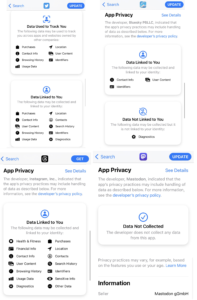Three Things: Goodbye, Good, Buy? Good – Bye!
[NB: check the byline, thanks. /~Rayne]
Given the quantity of news today worth discussing but not necessarily worth an entire dedicated post, I’m going to pull together three topics under this umbrella.
Consider this an open thread.
~ 3 ~
Goodbye – Mitch McConnell will step down as Senate minority leader, three years ahead of his retirement from the Senate.
I didn’t see this coming today, but then it probably should have been expected given the bullshit going on with the federal budget negotiations.
Hapless House Leader Mike Johnson has screwed up the negotiations in a whole bunch of ways, allowing the GOP’s vulnerabilities to be exposed each time a new sticking point surfaces to halt progress.
This past week, as one example, it was a poison pill amendment to halt prescriptions of abortion drugs like Plan B for dispensing through pharmacies and by mail. Oh, we can work with that – just look at what happened in Kansas post-Dobbs, when voters turned out in August 2022 to defeat a GOP effort to pass a state constitutional amendment banning abortion.
Not to mention the hassle of an evidence-free impeachment by the House of Secretary of Homeland Security Alejandro Mayorkas which the Senate must now consider for conviction and removal. Way to make GOP senators look both absurd and racist at the same time thanks to Johnson’s leadership in the House.
McConnell says the recent death of his wife’s family member reminded him of his mortality, which encouraged him to step down and take a seat in the back.
I think at 82 years of age, in iffy health, McConnell simply doesn’t want to have to sweep up after the rogue elephants in his party any longer.
~ 2 ~
Good, buy? – President Biden signed an executive order prohibiting the sale of Americans’ personal data to politically-adversarial countries like China and Russia.
This is an important measure which Congress should take up and write into legislation so that future expansions of privacy protections can be added as amendments.
It’s bothered me that so much personal data is freely available – your driver’s license or state ID and your property taxes are just a couple examples of data anyone can locate and use without any real friction like fees or documented requests kept on file.
But pair that data with purchasing habits acquired by data brokers and the accrued data is highly weaponizable.
It’s not a little thing for persons who are politically active, or even prone to exercising their First Amendment right of free speech.
The Department of Justice has deterred at least four assassination plots targeting persons in the U.S., stopping them before someone died as ordered by a foreign government. Imagine how easy it is to find a target and profile them to make the assassination fast and easy using personal data acquired from data brokers for mere pennies. No more assigning teams of personnel for surveillance – just buy the data, hack a few local area internet-connected cameras, and dispatch a killer.
Or send a drone, like Trump did to Iran’s General Soleimani, likely breaking norms against such assassinations.
Knowing that personal data is less likely to be acquired by hostile foreign governments might make some Americans more comfortable with making purchases which might create data sold by brokers.
Or, maybe not.
~ 1 ~
Good – Bye! – Trump could only post a $100 million bond today against the $454 million he owes in the E. Jean Carroll defamation NY state business fraud case.
It’s a pretty solid indication he’s broke. It should be a familiar feeling because he’s declared six business bankruptcies before.
Heck, given that many bankruptcies under his belt, this one he should be able to file on his own in his sleep. Maybe he’ll be able to save on attorneys’ fees by doing much of the work himself.
~ 0 ~
Bonus: Michigan’s primary results = so many bad hot takes.
I mentioned this in the wee hours this morning on Mastodon; the first take I saw in Washington Post missed a critical point about the way Michigan’s primaries are conducted, and how that affects the poll results.
RayneToday @[email protected]
There’s a critical problem with this analysis of the Michigan primary results: there are crossover voters who voted for Nikki Haley who will vote for Biden in November. The “uncommitted” vote may actually be a smaller percentage of total Democratic voters because of this practice of crossing over during the primary.
Unlike neighboring Ohio, voters aren’t locked into a party and can cross back in November. See 2000 primary when McCain won the Michigan primary. https://www.washingtonpost.com/politics/2024/02/27/4-takeaways-michigan-primary/
Union members are encouraged to do this though it may depend on circumstances surrounding the candidates.
The percentage of Democratic votes are not as they appear; there will have been Democratic voters who threw behind Nikki Haley, making Trump’s win margin look smaller than it is, while also making the “uncommitted” Democratic vote numbers appear larger as a percentage of the total vote.
I am absolutely certain this took place; I was asked by Democratic voters who planned to crossover which not-Trump GOP candidate would optimize this approach.
Of course in my opinion the best fuck-you to Trump is voting for a woman of color.
With regard to the “uncommitted” vote, what should be noted is where the most votes occurred in highest concentrations. Dearborn, where the largest number of Muslim and Arab-heritage voters live in Michigan, would obviously be expected as the location of the largest number of “uncommitted” votes.
For large news outlets to trumpet as a headline the protest vote sent a message is rather misleading, especially when most of these outlets couldn’t be bothered to report on the crossover vote.
Again, this is an open thread.







